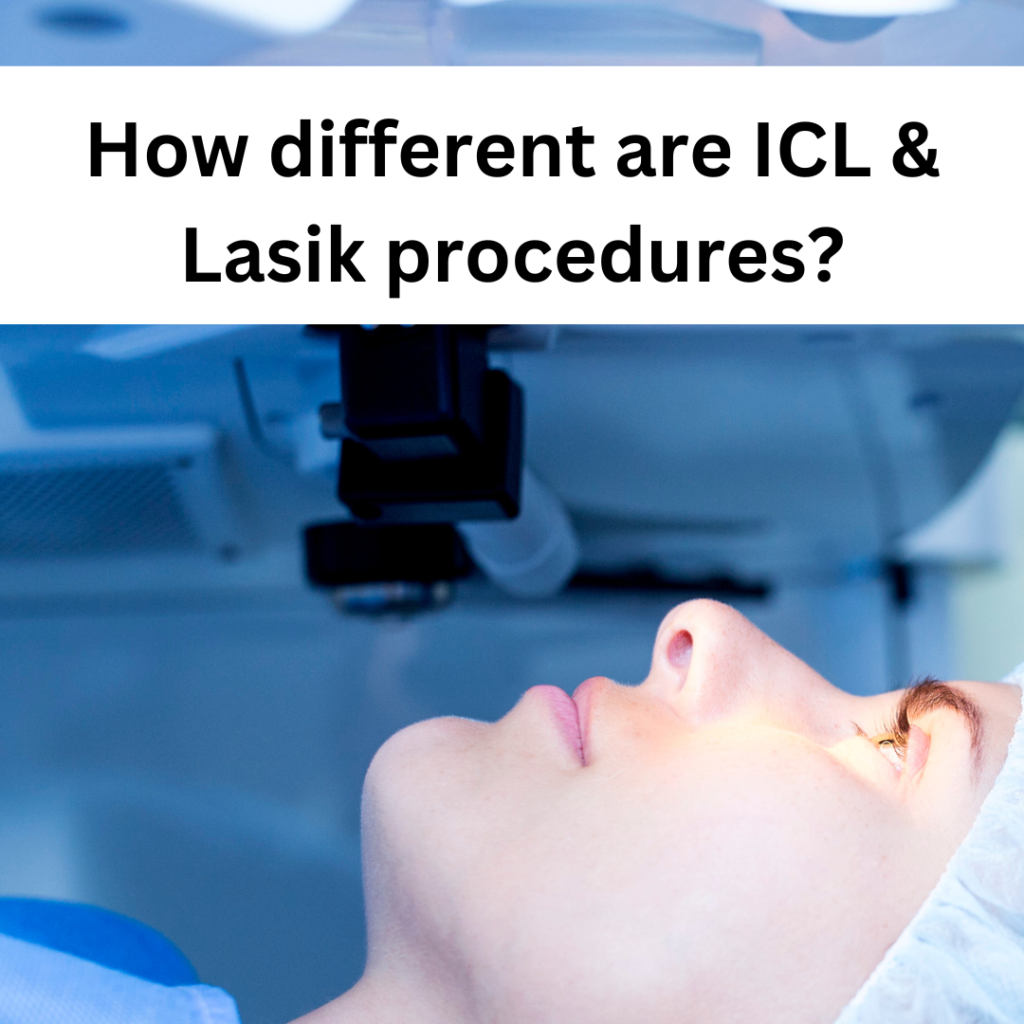How different are ICL and Lasik procedures?
The eye is an essential organ for human existence and health due to its role as a visual organ. Because of our eyes, we can see the world around us and learn more about it. The eye’s ability to analyze the light that things reflect or emit allows us to perceive their forms, colors, and sizes. And what if you know your eyesight is bad?
Many different kinds of eye care options exist for this kind of thing. Here, we’ll compare two popular corrective eye surgeries: LASIK and ICL (ICL eye surgery vs. LASIK).
Comparing Intraocular Lens Implantation with Laser Eye Surgery
First, let’s briefly contrast the two. ICLs are artificial lenses that mimic the performance and anatomy of intraocular lenses. The ICL is inserted in the eye in front of the normal lens, behind the iris, where it is invisible to the patient and anybody else looking into the eye.
To correct nearsightedness, intraocular lenses (IOLs) are implanted within the eye, whereas in LASIK, a corneal flap is removed to access the eye’s internal structures. Even while LASIK, a laser operation to eliminate the need for glasses, is the most popular refractive procedure, ICL is swiftly gaining favor with patients and eye physicians.
The Meaning of Collamer Lens Implants
The ICL procedure might be compared to LASIK. A qualified eye surgeon permanently inserts contact lenses into your eyes through surgery. The implantable collamer lens is a state-of-the-art thin and transparent lens that functions like a contact lens but is inserted into the eye during surgery (ICL). The ICL is hardly noticeable once implanted and may be removed if required; it also requires no care. The ICL is implanted in front of the natural lens and behind the iris rather than replacing the native lens.
What Is LASIK?
Laser In-Situ Keratomileusis (LASIK) surgery can treat nearsightedness, farsightedness, and astigmatism. With LASIK, your ophthalmologist will use a laser to modify your cornea’s shape permanently. Laser eye surgery improves the clarity of light falling on the retina. LASIK is used to correct a patient’s refractive error and enhance visual acuity. The need for glasses or contacts after LASIK surgery may be significantly diminished. It may even allow you to skip them if the circumstances are right entirely.
Insights about the Pros and Cons
Lasik
This simple laser-based technology has improved the vision of millions worldwide. Side effects might be bothersome, but they usually subside as your body heals.
Pros
- LASIK is quick and affordable.
- Fixing both eyes takes 30 minutes at the eye doctor.
- Cost-effective LASIK is growing more popular and cheaper. Vision insurance may help.
Cons
- Six-month side effects are possible.
- After surgery, halos or glares surrounding lights, dry eyes, and poor night vision may occur.
- Serious complications are rare with LASIK, one of the safer surgeries.
ICL
LASIK is more popular. If you can’t get LASIK owing to specific difficulties, ICL may be better.
Pros
- ICLs are superior to LASIK for thin corneas, keratoconus, and chronic dry eye.
- Complications are rare. However, the lenses are replaceable. LASIK is irreversible.
- ICL surgery takes 20 minutes for each eye, yet it’s still speedy.
Cons
- ICL costs much more than LASIK.
- Cataracts and glaucoma are somewhat more likely.
Which One Is More Preferred, Lasik or ICL?
Now that LASIK has become more widespread, it is also less expensive and may be performed by a wider variety of physicians. Most doctors recommend LASIK over ICL if you meet the criteria for both procedures. If you are interested in ICL but would rather not have LASIK, you should talk to your eye doctor. They can point you toward the solution that will benefit you most in the long run.
Why Rely us?
If you’re considering one of the treatments mentioned above, please get in contact. Millions of people’s lives will be improved by our efforts to make it possible for them to ditch their eyeglasses for good. For all of our patients, regardless of their ability to pay, Rana Eye Hospital strive to provide the highest quality ophthalmological treatment utilizing the latest diagnostic and therapeutic techniques.






No Comments